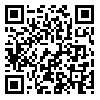Volume 4, Issue 2 (June 2025)
IJER 2025, 4(2): 0-0 |
Back to browse issues page
Download citation:
BibTeX | RIS | EndNote | Medlars | ProCite | Reference Manager | RefWorks
Send citation to:



BibTeX | RIS | EndNote | Medlars | ProCite | Reference Manager | RefWorks
Send citation to:
Fathi Karizak A, Afraz S, Samimi F. (2025). Relationship between Self-Assessment and Goal Orientation among Iranian Advanced EFL Learners. IJER. 4(2),
URL: http://ijer.hormozgan.ac.ir/article-1-352-en.html
URL: http://ijer.hormozgan.ac.ir/article-1-352-en.html
1- 1Ph.D.Candidate, Department of English, Faculty of Humanities, Qeshm Branch, Islamic Azad University, Qeshm, Iran
2- Assistant Professor, Department of English, faculty of Humanities, Qeshm Branch, Islamic Azad University, Qeshm, Iran ,a.sh32@rocketmail.com
3- Assistant Professor, Faculty of Humanities, Department of English, Bandar-Abbas Branch, Islamic Azad University, Bandar-Abbas, Iran.
2- Assistant Professor, Department of English, faculty of Humanities, Qeshm Branch, Islamic Azad University, Qeshm, Iran ,
3- Assistant Professor, Faculty of Humanities, Department of English, Bandar-Abbas Branch, Islamic Azad University, Bandar-Abbas, Iran.
Abstract: (9 Views)
Objective: This study investigates the relationship between self-assessment and goal orientation among Iranian advanced EFL learners. Self-assessment, a critical component of self-regulated learning, empowers learners to reflect on their progress, set personal goals, and enhance their language proficiency.
Methods: Using validated Likert-scale questionnaires, this study explores the levels of self-assessment and goal orientation among 150 advanced EFL learners in Bandar Abbas, Hormozgan, Iran. Descriptive statistics, correlation analysis, and regression analysis were employed to analyze the data.
Results: The results revealed that participants exhibit high levels of self-assessment and a strong preference for mastery-oriented goals, with moderate agreement with performance-oriented goals and lower agreement with performance-avoidance behaviors. A strong positive correlation was found between self-assessment and mastery orientation, while a weak negative correlation was observed with performance-avoidance orientation. Regression analysis indicates that self-assessment significantly predicts mastery orientation, explaining 46% of the variance.
Conclusions: These findings suggest that self-assessment practices promote mastery-oriented goals and reduce avoidance behaviors, highlighting the importance of incorporating self-assessment strategies in EFL education to foster intrinsic motivation and resilience. The study provides valuable insights for educators and curriculum developers aiming to enhance language learning outcomes in similar contexts.
Methods: Using validated Likert-scale questionnaires, this study explores the levels of self-assessment and goal orientation among 150 advanced EFL learners in Bandar Abbas, Hormozgan, Iran. Descriptive statistics, correlation analysis, and regression analysis were employed to analyze the data.
Results: The results revealed that participants exhibit high levels of self-assessment and a strong preference for mastery-oriented goals, with moderate agreement with performance-oriented goals and lower agreement with performance-avoidance behaviors. A strong positive correlation was found between self-assessment and mastery orientation, while a weak negative correlation was observed with performance-avoidance orientation. Regression analysis indicates that self-assessment significantly predicts mastery orientation, explaining 46% of the variance.
Conclusions: These findings suggest that self-assessment practices promote mastery-oriented goals and reduce avoidance behaviors, highlighting the importance of incorporating self-assessment strategies in EFL education to foster intrinsic motivation and resilience. The study provides valuable insights for educators and curriculum developers aiming to enhance language learning outcomes in similar contexts.
Keywords: Self-assessment, Goal orientation, Mastery orientation, Performance orientation, Performance-avoidance orientation, EFL learners
Type of Study: Original |
Subject:
Educational Studies
Received: 2025/01/19 | Accepted: 2025/03/15 | Published: 2025/06/1
Received: 2025/01/19 | Accepted: 2025/03/15 | Published: 2025/06/1
Send email to the article author
| Rights and permissions | |
 |
This work is licensed under the Creative Commons - Attribution 4.0 International. |






